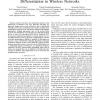Free Online Productivity Tools
i2Speak
i2Symbol
i2OCR
iTex2Img
iWeb2Print
iWeb2Shot
i2Type
iPdf2Split
iPdf2Merge
i2Bopomofo
i2Arabic
i2Style
i2Image
i2PDF
iLatex2Rtf
Sci2ools
117
click to vote
INFOCOM
2005
IEEE
2005
IEEE
Random-access scheduling with service differentiation in wireless networks
— Recent years have seen tremendous growth in the deployment of Wireless Local Area Networks (WLANs). An important design issue in such networks is that of distributed scheduling. The lack of centralized control leads to multiple users competing for channel access. This leads to significant throughput degradation. Existing approaches, such as the slotted Aloha protocol and IEEE 802.11 DCF, also fail to provide differentiated service to users. The upcoming IEEE 802.11e Enhanced DCF incorporates additional mechanisms to provide support for service differentiation. However, the level of differentiation achieved with these mechanisms is difficult to quantify. In this paper, we propose a class of distributed scheduling algorithms, Regulated Contention Medium Access Control (RCMAC), which provides dynamic prioritized access to users for service differentiation in a quantifiable manner. Furthermore, by regulating multi-user contention, RCMAC achieves higher throughput when traffic is bu...
Communications | Contention Medium Access | Ieee 802.11 Dcf | INFOCOM 2005 | Wireless Local Area Networks |
Related Content
| Added | 25 Jun 2010 |
| Updated | 25 Jun 2010 |
| Type | Conference |
| Year | 2005 |
| Where | INFOCOM |
| Authors | Piyush Gupta, Yogesh Sankarasubramaniam, Alexander L. Stolyar |
Comments (0)

